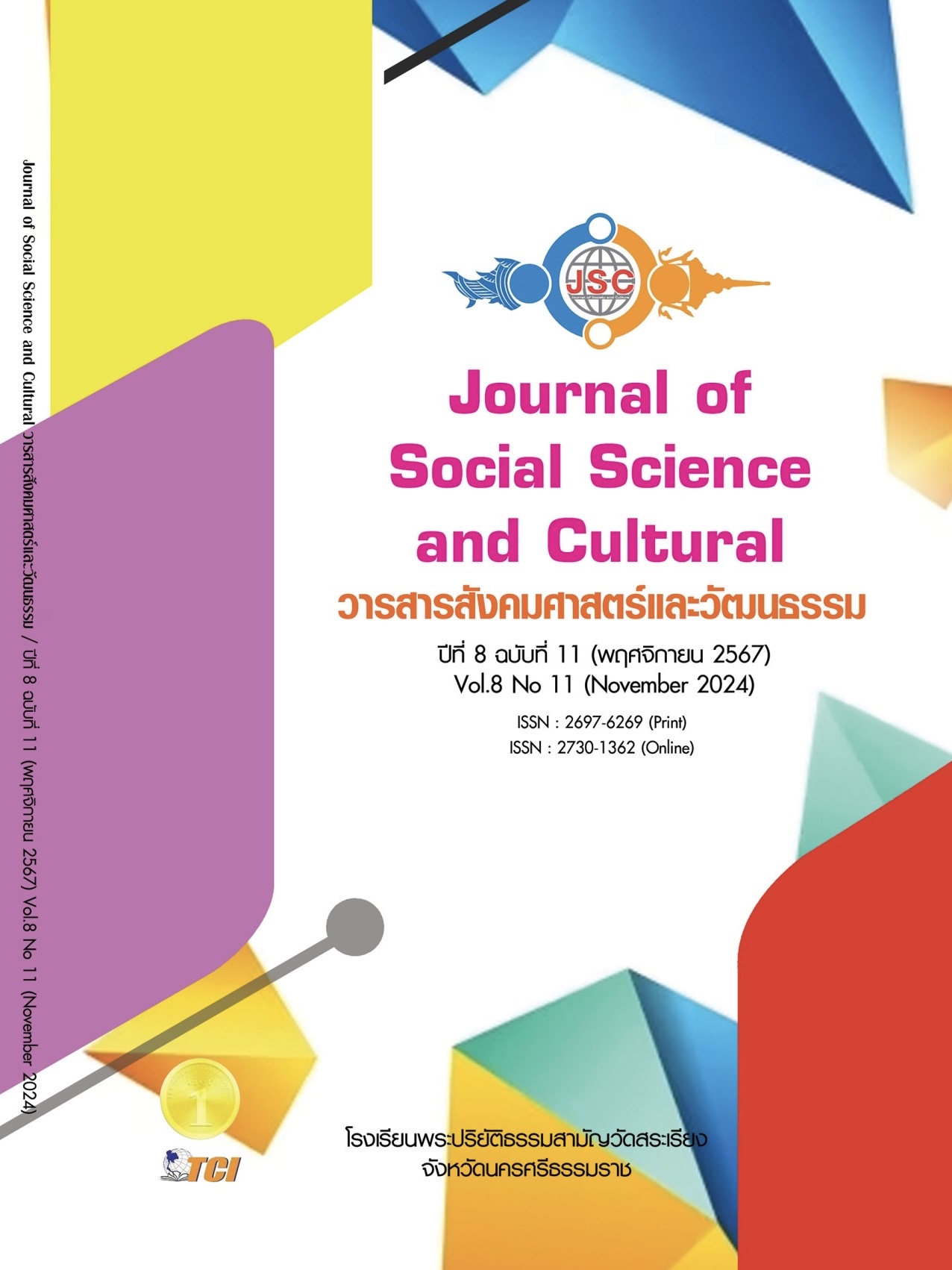OUTCOMES OF CO-CURRICULUM ACTIVITIES WITH SCIENCE EXPERIMENTS ON “FOOD AND NUTRIENT” TO IMPROVE BASIC SCIENTIFIC SKILLS OF EARLY CHIHOOD CHILDREN
Main Article Content
Abstract
The purposes of this research were 1) To study the basic scientific skills of early childhood children during organizing co-curriculum activities with science experiments on "Food and Nutrient", 2) To compare the basic scientific skills of early childhood children before and after organizing co-curriculum activities with science experiments, 3) To compare the basic scientific skills of early childhood children after organizing co-curriculum activities with science experiments with the criteria of 70%, and 4) To study the satisfaction of early childhood children towards the science experiment activities. The research sample were 20 kindergarten 3 students in Chumchonwatkhaolampa School in 2023 academic year. The research tools consisted of co-curriculum activity plans with science experiments on "Food and Nutrient", a basic scientific skill test, an early childhood children's a satisfaction assessment form. The statistics used in the research were: Percentage, Mean, Standard deviation, Wicoxon test and Binomial test. The research results found that: 1) This study the basic scientific skills of early children during organizing co-curriculum activities with science experiments in overall tended to increase, 2) This study the basic scientific skills of early childhood children were higher than before organizing co-curriculum activities with the statistically significant at .05 level, 3) This study the basic scientific skills of early childhood children after organizing co-curriculum activities were higher than the criteria of 70% with the statistically significant at .01 level, and 4) This study the satisfaction of early childhood children towards the organization of science experiment activities in overall wasl at a high level.
Article Details
References
กาญจนา ปุ้งโพธิ์. (2556). การพัฒนาทักษะพื้นฐานทางวิทยาศาสตร์ ของเด็กอนุบาลชั้นปีที่ 2 โรงเรียนบ้านเขวา (ราษฎร์พัฒนา) โดยใช้ชุดกิจกรรมเสริมประสบการณ์เพื่อพัฒนาทักษะพื้นฐานทางวิทยาศาสตร์. ศรีสะเกษ: โรงเรียนบ้านเขวา (ราษฎร์พัฒนา).
ชุลีพร สงวนศรี. (2550). เอกสารประกอบการสอนรายวิชาเด็กปฐมวัยกับทักษะกระบวนการทางวิทยาศาสตร์คณะครุศาสตร์. ลพบุรี: มหาวิทยาลัยราชภัฏเทพสตรี.
ซุรีญานี เจ๊ะแม. (2562). การจัดประสบการณ์การเรียนรู้ ชุดกิจกรรมการทดลองวิทยาศาสตร์. วารสารเทคโนโลยีและสื่อสารการศึกษา, 3(8), 41-54.
ทิศนา แขมมณี. (2553). ศาสตร์การสอน องค์ความรู้เพื่อการจัดกระบวนการเรียนรู้ที่มีประสิทธิภาพ. กรุงเทพมหานคร: สำนักพิมพ์แห่งจุฬาลงกรณ์มหาวิทยาลัย.
ธันย์ธนัทชนม์ ธนะหมอก. (2553). รายงานผลการใช้ชุดกิจกรรมวิทยาศาสตร์เพื่อพัฒนาทักษะการสังเกตและทักษะการสื่อความหมายของเด็กปฐมวัย ชั้นอนุบาลปีที่ 2. เชียงราย: โรงเรียนบ้านเกี๋ยง “คุรุราษฎร์วิทยา”.
ปิยนุช แข็งกสิการ และคณะ. (2561). ผลการจัดประสบการณ์แบบสืบเสาะหาความรู้ที่มีต่อทักษะการสังเกตและทักษะจำแนกประเภทของเด็กปฐมวัย. วารสารบัณฑิตศึกษามหาวิทยาลัยราชภัฏเชียงราย, 11(1), 155-135.
พรพิไล เลิศวิชา. (2550). สมองวัยเริ่มเรียนรู้. กรุงเทพมหานคร: สถาบันวิทยาการเรียนรู้.
พิมพ์พันธ์ เดชะคุปต์. (2548). วิธีวิทยาการสอนวิทยาศาสตร์ทั่วไป. กรุงเทพมหานคร: พัฒนาคุณภาพวิชาการ.
สถาบันส่งเสริมการสอนวิทยาศาสตร์และเทคโนโลยี. (2551). การจัดสาระการเรียนรู้กลุ่มวิทยาศาสตร์ หลักสูตรการศึกษาขั้นพื้นฐาน. กรุงเทพมหานคร: คุรุสภาลาดพร้าว.
สมปอง ราศี. (2558). การพัฒนากิจกรรมการจัดประสบการณ์การเรียนรู้โดยใช้สมองเป็นฐานที่มีต่อการเรียนรู้วิทยาศาสตร์สำหรับเด็กปฐมวัยชั้นอนุบาลปีที่ 2 โรงเรียนบ้านวังกวาง. วารสารวิชาการ เครือข่ายบัณฑิตศึกษามหาวิทยาลัยราชภัฏภาคเหนือ, 5(ฉบับพิเศษ) 53-68.
สิริมา ภิญโญอนันตพงษ์. (2553). การศึกษาปฐมวัย. กรุงเทพมหานคร: มหาวิทยาลับราชภัฎสวนดุสิต.


